
Season 1 to 2 transmigration falls flat
Those of us watching season 2 (S2) probably enjoyed season 1 (S1). S2 wasn't a bad season so much as it was a let down on expectations for continued enjoyment. Even worse, S2 had the effect of snuffing out some of the joy from watching S1.S1 wasn't perfect. The villains were flat and dumb. But the romantic and comedic charm was strong and alleviated duller elements of the show. Park Jin and Kim Do Ju's romance, for example, was anticlimactic in S2 and that was emblematic of many other characters and relationships that lost charm; they passed their peak and weren't contributing much to the story development. For example, bad cook Park Jin was overdone and not advancing the story or providing effective relief; it felt tiresome. Because S2 failed to keep up the charm, the less rosy parts of the show that were previously easier to ignore were now visible and frustrating.
Heo Yeom, who was charming and well-acted in S1, suddenly felt irrelevant and flat in S2. The same happened for too many characters such as Master Lee, Park Dang Gu, Maidservant Kim, Heo Yoon Ok, and the list could keep going on. Am I to believe the actors collectively performed less than their capability? Could the directors have pulled more from the actors within what was sourced? Nah, it's definitely an issue of writing in S2. I recall being surprised how soon S2 was offered after S1 completion. Perhaps the writers did not have ample time to craft S2. Plot 'twists' felt forced, rushed, and not believable. Characters were not well developed. Sang Ho, for example, deserved development in S2 but received none. Lady Jin essentially stayed the same petty version of herself throughout. Some even regressed; Heo Yoon Ok had charm in S1 and is written to be hated in S2. Character potential was squandered in S2.
Go Youn Jung (GYJ) was very enjoyable as Naksu; she exceeded my expectations by a mile. The scene telling Jang Uk to "Drink Up" was perfect. But, I still found myself missing Jung So Min's Filthy Mu Deok, especially Mu Deok's varied interactions with multiple characters. GYJ's interaction was heavily restrained to Jang Uk in S2. With Naksu's amnesia, the character lost complexity and missed the drive that Mu Deok had (to regain powers and seek vengeance); GYJ Naksu's drive was to remember, which we the viewer know all about, turning mystery of outcome to unbearable waiting. Again, this is a problem of writing, not of the actors/directing. Both FL actresses did a tremendous job.
Let's remember that Master Lee was exterminating shifters despite being a shifter himself. Or that he could be hands on and in save-the-world mode or wander aimlessly and not care about anything. Master Lee's treatment captures the broader sense of inconsistent story material with characters flip flopping personality on short notice. When the story was focused on slice of life charm, such as the Crown Princes' pining for Filthy Mu Deok, bromance with Jang Uk, and cold/warm love of Black Turtle, etc., the show was at its best. When the story power creeped itself as an apocalyptic story, it didn't deliver well.
Oh well, Drink up!

Filler and concerned faces stuck on a time loop
Story: It seems like a complex plot, with each time loop adding more insight towards the 'investigation', but I found the plot to be simplistic and over-reliant on a suspense-driving storytelling mechanism - the time loop. That mechanism didn't do much for me, intellectually, and certainly not emotionally. That mechanism lost value by the following issue: pace.Pace: Consider episode 15 of 15, 21:27 - 23:00, a scene with just vehicles driving around and sparse, inconsequential dialogue; 90 seconds of no plot or character development; it was about as interesting as looking at my hands for 90 seconds. There are a lot - truly a lot - of scenes throughout the show like this; they are filler. This could easily have been a 6 or 8 episode show, with tighter storytelling pace and keeping our heart rates higher. Instead, it felt like a slow burn detective story despite its design as a thriller. This is one of the most fast-forward-able shows I've ever seen. And in fast forwarding, it's easy to catch what's going on in the plot. Therefore, if you don't want to invest a lot of time, just fast forward a lot. I probably watched the 10 hours of actual content in about 6 hours of viewing time with hardly any issue in comprehension.
Characters: The ML and FL lack depth and are essentially 'tools' for the 'investigation'. We get a little bit of backstory, but there's not much to their characters other than the role they're playing in the 'investigation'. In fact, they are really the investigators using the police to help them solve the puzzle. Early on, it seems character development might happen with Lu Di (the cat dude), who adds interest to the plot. But Lu Di doesn't continue in the loop and returns to being a tool for the plot schematic. The perpetrators actually have the most development. We find out what is driving their terrible choices. Many character motivations are non-compelling and don't make sense. Basically, character development was muted and that limited the following: acting.
Acting: With such limited characters, the actors seemed to do their best, but there wasn't much 'range' of expression. We get a LOT of concerned looking characters, wrinkly foreheads, over and over. I'll try to highlight the best of the best in terms of acting. Liu Tao as Du Ju was understated, but very well done within the narrow design of the character; she was convincing as a poised, mature leader of the investigation team. Liu Yi Jun as 'Uncle' Zhao or 'Old man' Zhao also performed well. Incidentally, Liu Tao and Liu Yi Jun were also cast and performed well in Nirvana in Fire; however, in that show, their characters are deeper and more compelling. These veteran actors show us how skilled they are with their limited Reset character roles. The younger ML and FL have potential, but didn't show a lot of subtlety or range; these are not the best roles to judge their ability. Not for one moment did I feel their pairing to be chemical. Their connection looked and felt, as was written in the plot, forced. None of the acting in Reset was bad, but the limited character depth put a ceiling on what the actors could do.
Because the plot and characters are not well developed or particularly meaningful, I'm left to believe the storytelling mechanism - the time loop - is gimmicky. If the mechanism can enhance story and plot, I'm for it. But in this show, it seemed like the writer wanted to display the clever mechanism more than 'characters' or a meaningful story. It's as if the genesis for the story was "let's do something with a time loop" and that became the central focus of the writing. It wasn't started with an approach like "hey, I've got an interesting story and characters, what if we told it in a fresh way using a time loop".
The music was completely unmemorable. But it wasn't inappropriate either. It sounded like filler. Kudos, at least, for not being cringey or off-vibe.
My emotional satisfaction for this show was basically non-existent, maybe a 1/10. The most emotional I got was feeling bad for the watermelon guy. I rate it 6.5; because from a film craft perspective, it's not bad, it's just narrow. If I time loop back to the start of watching, I would probably pass.
P.S. Respect to bus drivers. They deal with crazy sh*t.

"Life is just one shot I won't hesitate; I have to live my own life"
Seeing the range of ratings and comments on characters doesn't surprise me. This was an interesting show. I often think about personal ratings objectively and subjectively. I might think a show is really top notch but makes little emotional impact and vice versa. If I think about rating Itaewon Class (IC) in terms of 'film craft' or 'intellectual analysis'- in other words, the more objective criteria - the rating would be much lower. For the 9.5 I'm rating it at, it's based on emotional satisfaction, re-watch potential, and how much it impacts my life.The story is the weakest part of the show, yet good enough. Many plot lines felt outrageous, unbelievable, even unnecessary. The vengeance plot was overkill. However, there are cues for letting go of realism and flowing with the outrageous. That the intensity of Janga vs. Danbam battles is set in a 'my sauce is better than your sauce' setting, helps us realize the set/story is intrinsically silly. In most shows, the feeling I get is that the characters are advancing the story. With IC, it feels the reverse. It's about the story advancing character. Their distinctiveness and authenticity, itself, is the most enjoyable aspect of the show. Who cares who wins the restaurant business battle? We know from the start how that is going to end. Character presentation, alone, intrigues me and elicits reflection on self and society.
Music. Very effective. Two anthems, "Start Over" by Gaho and "Brand New Way" by Damon, were stand outs, emotionally priming us for the mood of the show. "Start Over" is rhythmically driving, sweet, uplifting; it's a great tune to symbolize 'driving towards a goal'. If I recall correctly, this tune plays as Park Sae Roy is running, thinking about his goals. "Brand New Way" is energetic, over the top, fight-like; symbolizing Jo Yi Seo's brashness and growing confidence of the DanBam Team to battle Janga. If I recall correctly, it often played after something exciting or positive happened for the DanBam team.
Ok, Jo Yi Seo next. I understand the comments about not liking Jo Yi Seo as well as her non-convincing 'chemistry' with Park Sae Roy. But this is perhaps where older life perspective generates a different perception (or simply just my personal taste). I'm older and have grown tired of well-defined human behavior and socially constructed norms. That Jo Yi Seo is off the charts on social norms, and IC as a show is not normed 'averagely', I found that off-beat vibe to be quite refreshing. Novelty alone isn't enjoyable, but when done well (enough), it has the potential to wash the boredom away in a redundant world of similar plot/character types. Jo Yi Seo was unapologetically herself both with other characters and how she presented to us, the viewership. She was not ladylike or friendlike or daughterlike in the normal ways.
Regarding Jo Yi Seo and Park Sae Roy's chemistry, it's under the surface and brewing, slowly. In romance, Park Sae Roy is shy, implicit, and proper. With his rigid principles, a wildcard like Yi Seo is hard to digest quickly. She's brash, explicit, improper. Oh Soo Ah is that classic, proper beauty we're trained to love at first sight. Sae Roy's inner dialogue, inner feeling, may not be well known to him. He's obsessed with moving forward, higher, achieving his goals. Jo Yi Seo is the one that propels him forward, what he's driving at the most, releasing his emotions towards a larger catharsis once he's achieved revenge/success. Her acceptance of him as he is, and what he wants to become, is absolute, even ruthless; she'll hurt others to help him. Oh Soo Ah does have chemistry, but it's mostly attraction at the surface (eye) level and a past connection that she's held onto, which is understandable when considering her relationship to Sae Roy's father and being an orphan. Sae Roy and Yi Seo are climbers; they need to take risks to grow. Soo Ah isn't in climb a mountain mode; she's looking to maintain security.
Jo Yi Seo's impact on the DanBam team is very strong as well. The poem she sends to Ma Hyun Yi during the contest is impactful; I'll post it at the end of this review. As with Sae Roy, Dan Bam members have a slow time digesting this odd, acquired taste that is the brilliant Jo Yi Seo.
It is food for thought for those of us in our own romantic adventures. Eye-level attractiveness is a good start, but where does that really take us in the long run? Personality, values, helping one another achieve life goals and dreams, has an even larger upside than 'physical attraction' in the long run. Admittedly, the younger version of myself was more concerned with attraction. It almost feels irrelevant now at an older age. Therefore, comments about Yi Seo not 'looking' like the right partner for Sae Roy strikes me as a youthful comment. As the characters mature, it's not surprising to me that Yi Seo and Sae Roy grow together the best, and that he did indeed prefer Oh Soo Ah in his earlier years.
Jang Dae Hee was outstanding. The scene in Episode 6 (~1:02:00- 1:03:30) where he learns about a surprise stockholder, laughs outrageously, throws down his clipboard, then says "I thought I was hungry" and then "It's time to eat" is top notch. Watch that carefully and tell me that's not incredible acting.
Contrary to much of the reviews here, I didn't connect all that much with Sae Roy. He didn't disappoint me at all. I just didn't get much emotional impact from his character. It's probably the fact that Yi Seo, the diamond next to him, simply shone too bright.
Fun fact, although I had much Korean food before watching IC, I hadn't had the traditional 'stews'. When I had the chance to order between Kimchi Stew and Soft Tofu Stew for the first time, it was so hard to pick. My taste preference was for Kimchi Stew, but the show's effect was pulling me hard towards the Soft Tofu Stew. I ended up picking Kimchi Stew at the last second, but it's cute that a TV show nearly decided my maiden Korean stew order.
Here's the poem that Yi Seo recites to Hyun Yi:
“I’m a rock.
Go ahead and sear me.
I won’t budge an inch because I’m a rock.
Go ahead and beat me up
I’m a solid rock.
Go ahead and leave me in darkness.
I’m a rock that will shine all alone.
I don’t break, ash, nor decay as I go against nature’s way.
I survive.
I’m a diamond.”
Itaewon Class, Episode 12
Poem by Gwang Jin creator of the original web comic series Itaewon Class.
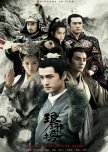
Becoming extinguished
Nirvana Fire - an appropriate title for this philosophical story. The meaning of Nirvana (via Britannica): Literally, it means “blowing out” or “becoming extinguished,” as when a flame is blown out or a fire burns out.Quick summary: The story is incredibly well crafted; varied and complex characters; the plot was well paced and not too long at 54 episodes; ambience of music, cinematography, and costume was effective; there was a good balance between political intrigue, wuxia, military, romance, fantasy, etc.
The first few episodes can be confusing, so a character chart and episode recaps can help. However, the show is successful introducing characters, developing them, so that viewers get a clear grasp of what's going. When, for example, we meet Lin Chen in the first episode, then he disappears for 40 or so episodes, we are still well connected to him in his return at the end of the show.
Many characters besides Lin Chen were distinct and well-presented. It was a joy to watch their depth, development, and interaction with one another. I'll highlight a few gems. Because every character was so eloquent and precise in speech, Fei Liu's stunted and grunted speech was an effective counter point. Bai Li Qi, the northern fighter, was quite enjoyable (and cute). Consort Jing was impressive - the queen of "my pieces are moving on the board, but you can't see them in the first place". Eunuch Gao Zhan was subtly humorous and the perfect counter point to the Emperor. He had an awkward, yet charming smile. I won't even praise the main cast here because you'll undoubtedly agree how terrific they were.
Besides distinct and well-presented, most characters were complex and nuanced. Grand Princess Li Yang is a model character of complexity. Despite the awful circumstances of being forced into matrimony with Xie Yu, it's obvious they've grown great affection for one another. This character also outlines the moral/philosophical crux about this show. While Grand Princess Li Yang did some terrible things, she was able to reverse her path of moral degradation and contribute to something wholesome later on. Even though the truth of the Chiyan army massacre was covered up, seeking the truth while losing face, is the correct path. Looking at modern leaders who are wholly unapologetic for their mistakes or looking to rewrite history through propaganda and social ignorance, it's a reminder that this moral push and pull in the grand societal play is persistent like a good weed.
One thing this show got be thinking about was rebirth. Not so much in the 'wait til I die and start life again in a new form sense', but rather what change or 'rebirth' can one experience within the current life span. Many of the characters go through processes of change and, are effectively, a new form of themselves. And I wonder how distinct our life embodiment is vs. shared with others and carried forward by others. Lin Shu is reborn into Mei Changsu and then is reborn into Lin Shu again; it is as if he has had 3-lives in one lifespan. People's characters, goals, values, and dreams are also 'reborn' through others. For example, Prince Qi dies, but his life spirit is reborn through Prince Jing and others. We cultivate life spirit, disperse it to others, and don't need to count on death/rebirth to 'progress' again. The idea is not to wait to improve or change one's form in the next life and simply accept what one is now. Cultivate now.

The 'Dating in the kitchen' part was charming; the rest.. not so much.
The ML is a CEO in a strict, cold, business profession; he finds refreshment in the FL's artful cooking and cheerful/mischievous personality. The FL, while struggling to maintain financial security, finds security and support in the gentle-mannered ML. The leads were yin and yang, balancing one another well, savoring the genuine connection with one another, and certainly the best part of the show. The food/cooking was a welcome third wheel and added interest to the romance. Any viewers suddenly feel the urge to up their cooking game? I know I did. The 'age gap' didn't look or feel awkward as expected. Their differences in personality and social statuses were more prominent. A larger topic to consider was the intergenerational dynamics between elders in family/business and the impact they have over younger counterparts.Unfortunately, it's downhill from there.
The story got off to a strong start; you could grasp the 'Dating in the kitchen' theme quite well; it had a nice charm. However, the story evolved into something else - a business/family/power struggle - and there were long stretches with no food or cooking. There were several times I wondered "Does the FL still have their cooking job or are they getting an allowance from the rich ML"? It is as if that part of the story was ignored and then brought back in an abrupt way at the very end. The romantic charm quickly wore off in the second half of the show.
The supporting characters and their storylines were unremarkable, and at times, simply irritating. Li Man was the strongest support and well-acted, but ultimately let down by the writing. The story would have been more complex and enjoyable if the kitchen and business side staff weren't so dull and untalented unlike the sparkling leads who never make mistakes.
The show attended to a few social themes, but often in an inconsistent or contrary manner. For example, they would criticize an implied sexist remark accompanied by the touching of someone's wrist, but then we see the ML pinning the FL down, grabbing her wrists aggressively, and even forcing the FL to give up their address and invite the ML for personally cooked meals as a debt; I guess it's okay since they're charming and bound to fall in love.
Don't think too logically while watching this show, otherwise you may get aggravated. Just know there's some delicious food being cooked here and there.

Great moments, but significant watch time may limit some viewers from starting
The strength of the show is the assortment of interesting characters. Many are well developed and have meaningful interactions with one another. The plot is definitely saucy and spicy (maybe makjang-ish?), but not particularly deep or substantive. Much of the show is predictable. The show's setting, which revolved around the family restaurant - Daddy's snack Bar - was underdeveloped. In fact, it was basically not part of the last third of the show. The show focused on family relationships and de-emphasized the work settings. Again, what makes the show worth watching is to savor quirky characters and special moments of humor, drama, and growth that make the show stand out.Because the watch time is quite long, there are stretches where the show feels boring or fluffy. You'll probably get a feel for what sections you would want to move through quickly.
Stand out acting: Lee Yoo Ri as Byun Hye Yeong felt expert. Song Ok Sook as the privileged Oh Bok Nyeo was strangely fascinating and enjoyable. Most of the time, I would not like this kind of ' mean mother-in-law' role in shows, but I just loved her in this show. Kang Suk Woo as Cha Kyu Taek was also expert in his role.
Compelling characters: I found myself loving scenes with Byun Ra Yeong (youngest daughter). Her role/acting was more one-note and over-acted at times, but the character was still compelling. Again, Oh Bok Nyeo was something I 'paid more attention to' when she was on the screen - a terrific character.
*Edited note on Jung So Min* - many will be interested in seeing her as she's a current popular star. I do like Jung So Min in other shows. Her character had a great introduction and start; it seemed like someone I would really want to keep track of throughout the show, but the character doesn't develop much and I also didn't feel the chemistry with her love interest and even her family. I don't think this is a reflection of the actress's skill, but more of the writing being 'forced' and not 'natural'. So, a Jung So Min completist may want to watch this show but it's not 'must watch Jung so Min because its so good' viewing.
Music was very effective. Not something I'll download, but great at echoing the mood of the moment. Many silly tunes.
Favorite Scene: Na Min ha really wants to go to an advanced science school, but his family finds it problematic to pay the tuition. At a bus stop, he runs into a pretty teacher working at a less competitive high school. Suddenly, Min Ha is desperate to go to the lower competition high school. His impassioned plea to his parents is such a treat.
I wouldn't rewatch the show again. Not because it's not worth it content-wise, but the time commitment is too much, and I would be skipping through half the show to watch the gems.
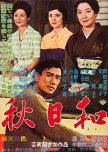
Another variation on a theme by Ozu
Late Autumn (1960) is Ozu's 3rd to last film. It is recommended not to start one's Ozu exploration with this film. Wait to have seen at least four or more Ozu films. Late Autumn is a strong film, but essentially a variation on past films. Yet, it is quite enjoyable and not boring even if this is your 20th+ Ozu film. In fact, this film is more appreciable for those that have worked their way through Ozu's films, especially the post-war ones in which Setsuko Hara is introduced. It is after viewing those prior films that we are well acquainted with Setsuko's roles in the Ozuverse.There is something about Setsuko's roles that holds a 'constancy' to a certain human temperament. Setsuko's roles are often melancholic and pure, even if they are understated. Perhaps Setsuko's roles better convey 'mono no aware' than any other Ozu characters. Her characters are wholesome, wonderful, but it is transient; while we may catch glimpses of this human character in ourselves or throughout our lives, it is a rare quality, easily squashed in our brutish world, which distorts that temperament in people that can be pure, graceful, and delicate.
Late Autumn excels in utilizing its versatile cast without any character(s) dominating the plot or screen. All are enjoyable. The trio of old men are comical together; their old-fashion and subtle mischievousness contrasts with Sasaki Yuriko's forward communication and modern woman temperament. It was refreshing to observe Yuriko's forwardness in an Ozu world full of politeness and subtlety. Her character role helps break the ice and push through a few social impasses. The exchange where the young Yuriko chews out the old men is terrific. The old men's interactions with their wives, children, and maids is also enjoyable; their loved ones seem to know the old men so well. The comedy here is that the old men try so hard to be clever but are quickly found out by all.
One of the most accomplished aspects of Late Autumn, compared to other Ozu films, is the music. In this viewing, I found little to be lacking in the music. Late Autumn's music is sophisticated, precise, and synced to the action, and does a remarkable job of conveying 'soaring happiness' or 'resigned melancholy'.
Overall, Late Autumn's presentation is bright and cheerful. It belies the more melancholic themes of the film, which are disguised through frequent interjections of comedic scheming. Ozu also limits the melancholy we can access. Several times, we see Setsuko's character, Akiko, kneeling on a mat and looking away (we cannot see her face); certainly, she is sad but the decision not to show her sorrowful face is an interesting decision.
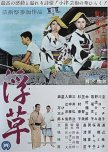
One of Ozu's best films; escape to a lazy seaside town
Floating Weeds (1959) showcases Ozu at his peak. This is a top notch film. While it might make sense to watch several other Ozu films beforehand, or even 'A Story of Floating Weeds' (from which Floating Weeds was remade), this film is also great as a first entry into Ozu's film world. Despite its PG rating, it's not an ideal film for young children.The film plot is more versatile than usual Ozu fare, with more sub-plots, and greater role character involvement. This is still a family drama, but the film's setting in a seaside town (somewhere near Seto Inland Sea) is a departure from the urban environs of many Ozu films, which take place in cities like Tokyo. And, rather than a family under a roof, we have a 'traveling family' here in the form of an acting troupe. The troupe members, like ronin - the wandering samurai of the Shogun-era, are never more than half-anchored to a place. At times, they seem desperate to put down roots but are so easily blown away by their own troubles, insecurities, or economic woes.
For those that enjoy romance, that part of this film is sufficient and enjoyable.
The sets were terrific. Ah, how much I desire to travel to a classic town where this film was made! The dark wood buildings containing eateries, post stores, and barber shops, blend seamlessly with residential space; a customer may be eating noodles at the home entrance room, and the room behind that is the cook's personal living room. This is not a town of commerce, but a place of quiet living, capturing what commerce enters their lazy cove. Business matters are lax. Having visited seaside towns before, there is something quaint, remote, and even nostalgic about these places. They are hiding from society.
The presentation of social life in this seaside town is antithetical to many Ozu settings where the industrial rush is in full display. The economic reality of such a place is not sugar coated either, but the film's place and people feel authentic, carefree, and even romantic. It's the place of quietude we've visited before that we yearn for in our busy lives, or simply never visited but instinctively know we would enjoy such a relaxing pace. In fact, the film's lack of emphasis on city, commerce, and post-war themes, as well as societal changes of the times, made this film feel like a timeless exploration of being human. It was, compared to other Ozu films with a clearer link to societal themes, refreshing to watch "Floating Weeds" without a societal themes commentary/agenda. It had a bit of an escapist feel to it, even for the veteran Ozu viewer.
Part of the humor in this film is that the troupe is not very good. But they're compelled to act together, drink together, and travel together. There's something about this group of semi-outcasts that is endearing. They are imperfect people, willing to backstab one another and then make up a week later, despite not being blood related. They don't feel like co-workers at all.
Machiko Kyo, as Sumiko, was captivating, complex, and convincing. She was, without a doubt, the star of the show despite having the 2nd most prominent role. Her earnestness and desperation is so restrained you can barely tell it is there as she masks it with jealousy, scheming, and cruel words. But we feel the slightest brush of her deepest emotion against our skin; despite a lifestyle of traveling with the wind, Sumiko craves a rooted relationship and won't give that up easily. There is a scene of reconciliation in this film that is simply masterful.
Ozu's style seems to have matured, even peaked in 'Floating Weeds'. I found the storytelling approach to be straightforward with fewer ellipses/gaps. Here, Ozu 'shows' us more of what we are thinking rather than implying action. Personally, I prefer a visual accompaniment as it is something to savor and sensually experience, rather than intellectualize alone in implied action scenes. I'm glad Ozu leaned on this more conventional approach in Floating Weeds.
A terrific film.
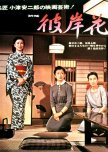
Exploring the gap between Parent and Child
Equinox flower (1958) was Ozu's 48th film (of 53) and his first feature film in color. As with all Ozu films, Equinox Flower is a family drama.This film focuses on an upper middle class family in conflict; that is the daughter's decision to choose a marriage partner without consulting parents and a parent's view they should be involved in the decision. It might seem filmgoers would automatically side with the daughter in this story, but many will sympathize with the old-fashioned father to a certain extent. If this topic interests you, do watch the film and be aware of your perceptions, thoughts, feelings, and judgments.
One side note, is that the title, "Equinox flower", is also the common name of an Asian lily - Lycoris radiata; it is also called 'red spider lily', 'red magic lily', and 'corpse flower'. It is a beautiful red flower (look it up online!). This flower blooms in August-September, close to the Autumn Equinox. The flower has some cultural relevance to death. Consider what element(s) of the film may symbolically link to this flower. Does it represent the decay/death of a parent-child relationship when the child marries and becomes 'independent' from parent?
This film primarily explores the gap or 'conflicts' in perception that parents and children have of one another. The following 2 script selections represent that gap.
Says one Mother to another mother:
I'm doing all I can,
but Yukiko (the speaker's adult daughter) just keeps telling me
to leave her alone and not bother her.
Children are so ungrateful.
Our children are the same.
It must be the same everywhere.
Says one adult daughter to another adult daughter (--):
I envy you, Setsuko.
Your parents aren't like my mother.
They're so understanding.
--I wouldn't be so sure of that.
They're not like Mom at all.
She always goes on and on
and never gets to the point.
--She has an interesting way of talking.
Yeah, too interesting, if you ask me.
Setsuko, we should team up.
--What do you mean?
You help me
when my mother's being unreasonable,
and I'll do the same for you.
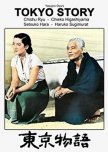
"To lose your children is hard, but living with them isn't always easy either. A real dilemma."
Tokyo Story is the third film of the loosely connected "Noriko Trilogy" and probably the most well known and well-regarded by critics. Family and societal themes are explored extensively in this film as was the case in Late Spring (LS) and Early Summer (ES). Tokyo Story (TS), perhaps, leans a bit more on societal changes in response to the post-WWII industrial boom. The younger generation, clearly, is consumed with work and family matters play second fiddle. In LS and ES, there are societal changes, but the social world is slow paced and lazy as if it is in stupor from the recent war tragedies. In TS, the social world is at a frenetic pace; folks are concerned about getting seats on trains; messengers rush about to deliver telegrams; and hot spring hotels - places typically associated with relaxation - are conveyed as rowdy gambling denizens.Although I may have disapproved of some of the character temperaments in LS and ES to a mild extent, TS introduced the first truly irritating character - Shige who was the eldest daughter of Shukichi and Tomi. Ozu's characters and plots in the Noriko Trilogy tend to be subtle and restrained. Shige's rudeness and obnoxiousness was too plain. And while I don't mind that the character has those traits, their 'in the face' presentation of those traits was distracting. When I read descriptions of TS, reviews, or commentary, I noticed there is an over-generalization that the children in this film did not care about their parents. That's simply too black and white. A close inspection of the characters reveals that the circumstances of the busy children and aging parents are much more complex. In fact, the filmmakers utilize Noriko to elucidate these complexities by asking Noriko to explain to Kyoko, the youngest daughter, the nuances of the family's inter-generational dynamics. Personally, I feel the commentary on family dynamics presented in TS would be have been more effective, and certainly more enjoyable, had Shige been presented as a nuanced character.
Noriko, while still a praiseworthy character in TS, felt the least compelling when compared to Noriko in LS and ES. In TS, her filial piety towards her mother and father in-laws felt slightly forced, even inauthentic. Perhaps the filmmakers and viewers of LS and ES were accustomed to Noriko's temperament across films and would have no problem with this presentation in TS. Yet, viewing Noriko in TS without those prior associations, I stand by the presentation as weaker. Even more so since Noriko of TS was not living near her in-laws nor was she in frequent communication. Playing up her filial piety in contrast to the blood children's selfishness felt inauthentic. It was an unfair presentation of the children to beat us over the head with a point where nuance would have served better.
Despite TS's prestige, I enjoyed this film the least of the three Noriko films. I found myself more conscious of the slow pace of TS compared to LS and ES. It is still a strong film, but it makes me wonder why so many folks seem to place TS at the top of the Trilogy. There are, from a filmcraft perspective, some marked improvements. In TS, the music right off the bat signalled greater complexity and maturity compared to the earlier films. Camerawork was steadier and more varied. There are probably other 'filmmaker' improvements that escape the average viewer's eye. So, I suspect that filmmakers appreciate these advances in craft and rate it highly. But for me, as an average film viewer, the quality of narrative and impact to self was a few steps beyond my viewings of Late Spring and Early Summer.
Lastly, the setting of Late Spring and Early summer was clearly Kamakura; in fact the opening scenes place us at Kita-Kamakura station (a place I've been to). I enjoyed that specificity of location. I could even look up what Kamakura looks like at present if I want. In Tokyo Story, the story took place, loosely, in Tokyo. Well, that's a pretty large area and can mean many places depending on the cultural context. In short, I would have appreciated greater details about the locales of the characters, especially since Shukichi and Tomi were being 'shown around' Tokyo. Yes, we know they go to Akami, which is outside of Tokyo, but within their Tokyo adventure, we get no locations.
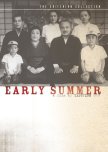
The weight of family expectations, oh how heavy.
Although the three Ozu films {Late Spring, Early Summer, and Tokyo Story} are not connected in story, we see many of the same actors, and the female leads -all named Noriko - are played by Setsuko Hara. Across the three films, we experience similar family and societal conflicts and a consistent visual style, film pace, and sleepy music. There's a familiarity and continuity despite all three films being distinctly different stories. The films were made in in close chronological proximity - 1949, 1951, 1953. They're appropriately considered the "Noriko Trilogy" for that connectedness we feel when watching the trio of films.The overall pace of this film is andante (moderately slow). So when there are scenes of anger or lightning quick decisions, we feel those scenes powerfully. Noriko's spontaneous decision to accept an impromptu marriage proposal is profound, shocking, confusing. Can this compliant daughter really act in such an individualistic way is what we wonder. But let it sink in a bit more, and it's all too obvious that the decision makes sense. We're given clues about the 'cost' of social obedience. Noriko's unkind brother and forlorn sister-in-law are moving along with their arranged marriage as puppets in a play. Noriko has enough experience with the type of man she doesn't trust; her brother is unkind and controlling; her boss is flirty; her suitor, Mr. Manabe, sends a private investigator to research her - wouldn't we feel a bit slimy after that? The filmmaker teases us by not even showing us what Mr. Manabe looks like; who cares if he's rich and good looking? Noriko's selection of Yabe is somewhat by process of elimination. She even argues that she doesn't 'love' him and instead 'trusts' him. He's the one to accept her individuality, the one she can lean on for support rather than take instructions from.
Noriko's independent decision, without consulting family - or even the groom! - is symbolic of a change or breakdown in the social order. Post WWII, Japan was grappling with many societal changes. Even the films that Ozu made were subject to intense censorship by American authorities. It's even comedic that Ozu chose a young woman making a choice for themselves as the symbol for social order breakdown; how dare a woman do that! I suspect Ozu's sympathies lay with Noriko, with individuals, and felt it was important to highlight individuals' livelihoods. When people are lumped into groups, we may come away with dangerous biases and generalizations, not only beliefs about others but also beliefs directed inwardly. Certainly, many Japanese did not want to fight in the wars, but were forced due to the social order; it was not acceptable to go against the rise in nationalism. Ozu, it seems, welcomes this social order breakdown. Yet, in that breakdown, there are things to lament, things that are lost. Noriko will move away from her family; her parents will move away as well to live with their elderly uncle. Like a wistful wind, the family is dispersed to far places in Japan.
Many of the actors in the Noriko films play different characters, roles, with wide ranging temperament. Chishu Ryu is a gentle, middle-aged father in Late Spring, a brusque and dominant elderly brother in Early Summer, and a resigned grandfather in Tokyo story. It's in watching his range in all three films where we fully understand the actor's skill, and long-lasting collaborating with Ozu (he appears in 52 of 54 Ozu films and featured in over 160 films and 70 television productions). Chishu's forceful manner in Early summer is quite enjoyable because of the contrast to other roles. It's a breath of fresh to see him in something other than a docile, fatherly figure. Setsuko Hara, on the other hand, maintains a continuity in character and affect. There's a stubborn purity to Noriko; when her purity survives, it is satisfying and comforting, but when it is broken, it is heartbreaking.
What exactly did Noriko represent to Ozu, Japan, and to the broader film audience of the of 1940s and 50? What does Noriko mean to us now in 2023? This is, in part, the beauty of the Noriko films, that it elicits so much reflection at a broad, universal level.
A loaf of bread loses its dignity in this film.
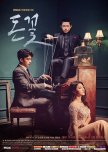
Slow blooming revenge
I had humble expectations for this show and was pleasantly satisfied with the quality. Kang Pil Joo, alone, was worth the watch. No need for me to comment on him here as others' reviews cover his merits in depth. Watching his revenge is like listening to Ravel's Bolero; we're introduced to the theme and it marches forward ever so slowly, repetitively, adding complexity, until it reaches a rousing culmination; a whisper to a fanfare.The story relies on the common plot schemes of corporate/political/family intrigue. You know - those stories we're accustomed to where no one is safe around their extended family members and you're never sure if 'Uncle is going to poison your eggrolls or not'. The plot is serviceable and allows us to enjoy some great characters and fine acting.
Pacing was excellent in the first half of the show. In fact, there's so much plot development early, I wondered how they would fill the last 12 episodes. It reminds me of political dramas like Chief of Staff or Stranger with a thriller pace. The 2nd half did slow down a bit with increasingly soapy moments where characters stare at each other with dramatic music for 15 seconds.
The characters were mostly well designed; the cast put forward a great performance. Other than the ML, Jang Sung Man and Jung Mal Ran were standout actors. They were both compelling and convincing even though viewers obviously root against them. Jang Sung Man's character and acting are flawless; there's nothing I would change in design or performance. Jung Mal Ran's character was intoxicating. Her berating and deprecating behavior towards Pil Joo, combined with an undercurrent of electric desire, was terrific. I'd welcome her and Pil Joo actually connecting as a couple in a Stockholm syndrome alternate storyline. They had more character chemistry (not strictly romantic) than Pil Joo and Na Mo Hyun had. Well, their 'relationship' drove the plot, so it is not surprising this potential chemistry was achieved.
Na Mo Hyun's character seems simple, but is rather subtle and complex. This is the toughest character for me to evaluate. I guess viewers that didn't like her couldn't root for someone that was duped into a marriage for hire scheme and then hangs around, knowingly, for the abuse to come. Personally, I enjoyed Mo Hyun's character. Her character is one I'd want to watch carefully in a re-watch.
Boo Cheon's character grows a lot, perhaps the most of any character. But I didn't enjoy or connect with this character. It's odd because I usually enjoy characters who grow. If I could identify one reason for lack of engagement, it is that his character trajectory is wholly predictable. His character lacked that essence where a character feels like a genuine, unique entity, a sense of being compelling. We've seen revenge seeking characters many times before, but Kang Pil Joo is successful because he doesn't feel like other characters we've seen in that 'role'. Boo Cheon didn't achieve that essence.
Many support roles had short times on screen, but were well done. Han Eum Shim, despite being an annoying character by design, was one I was surprised to enjoy. Mistress roles are often narrow in design, but Eum Shim had enough complexity to earn their screen time. Yoon Seo Won was too simplistic, yet enjoyable, and used well in the limited screen time.
The music was effective, but forgettable. The music was soapy sounding at times, but it wasn't overbearing in that sense. Like the music, the cinematography, sets, and costumes were serviceable, but unmemorable. That's okay, because the plot and acting was strong.
Re-watch value is a bit higher than I expected because after browsing earlier scenes, it got me to thinking about characters in a new or enhanced way. So, a re-watch for character analysis rather than to savor the plot is justifiable.

Parkour guy gets revenge on everyone for missing out on the olympic gymnastics team.
I tried. I really tried.Through 9 episodes, I was praying this show would pick up. Surely, I thought, "it must pick up, I'm missing something here; I've pushed through mediocre beginnings before. It seems like a well rated and popular show. Show me something, anything, even one likeable character to hang on to". I waited patiently, but nothing materialized through nearly the 50% mark of this show; close to 10 hours of development. That's simply not acceptable for me - to have zero positive elements to experience or look forward to. I can accept a blend of bad and good, but an absence of any good is a complete turnoff.
First off, the music was noticeably bad and corny. Music, at worst , should be neutral, unmemorable, and not distracting. It's a sin if it stands out as bad. At that point, I'd rather there be no music. Just cut it out.
Second, in most shows, I can usually criticize the plot/writing more than acting or directing. In this show, the plot was actually the 'best' element, and it was still mediocre (5/10). Picture this: a young man parkours his way across building rooftops while chasing a vehicle through the city, he dives through people's windows into their living rooms while they're watching TV; he's being aided by a 50s tech hacker wizard with frizzy wild hair who can hack any computer, CCTV, etc., in real time, and bark directions to parkour guy on where the car is going; by the way, the hacker and parkour guy don't know each other's true identities but work together in this risky way with high trust; they must sense each other's age through voice because parkour guy speaks formally to hacker wizard; parkour guy is able to keep up with the car and doesn't even seem out of breath, never trips or loses his footing - oh and it is nighttime, too; he gets into fights with thugs, does gymnastics high bar routines while politely hitting thugs; no one knows parkour guy's identity because he wears shaded glasses and dark clothing with the top of his face covered; he has no morals and gets paid to do a variety of sh*t for mostly privileged and immoral men; without a doubt, parkour guy is just venting, displacing his anger for missing out on the Olympic gymnastics team; do you want me to keep explaining this further or do you get the picture?
There are long scenes with corny music and implied plot development. For example, check out episode 9, 27:00-29:00; it is two minutes where character A is thinking about character B wistfully, while character B is watching character A secretively. Guess where Character B is? They are parkouring their way across rooftops following Character A through random parts of the city 'protectively watching them'. 2 whole minutes. This scene isn't a sole transgression, there's quite a bit of this. Again, let me remind you, the plot is the strength in this show.
Third -and this is the first show for me in about 80 shows -I felt the acting across the board was, at best, mediocre. I cannot believe how average to bad some of the acting is in this show. I'm not even talking about I didn't connect with 'characters'. I'm talking straight up mediocre acting performance. Sadly, most 'characters' didn't even have a chance to shine even if the design was decent, because the acting was corny, unnatural, forced. Joo Yeon Hee? Intellectually, we are supposed to feel bad for this character's circumstances; instead I felt bad they were written and acted the way they were. I've enjoyed Park Min Young in a few shows, perhaps not super impressed, but enjoyable enough. I could not stand the character of Chae Yeong Shin and the acting was off. Awkward singing, overacted do-gooder, ridiculously naive, and lacking tact, Yeong Shin was difficult to watch and root for. Her romance with Seo Jung Hoo or "Healer" was plain awkward. The first kiss they share while they cannot see each other, is uninspiring; in some reverse alternative universe, the girl now, not Healer, has the upper part of her face covered. She was not skeeved out at all getting kissed on a rooftop by someone she can't see and doesn't know; maybe all the viewers that rated this show 10/10 like that kind of romance. Aigoo, I've had better kisses with pillows. Serious!
Sometimes, a show is not that high quality, but I understand what's happening in the plot well enough to skip the less interesting bits so I can enjoy the parts or characters that are enjoyable. In Healer, there wasn't anything for me to enjoy. Healer is the first show I wanted to fast forward, but couldn't because the plot was complex enough, that to fast forward scenes would impact comprehension. To comprehend, I had to watch. Ultimately, I could not justify doing that for another 10 hours.
I'm genuinely confused at what the high raters experienced.

Loss of innocence
This show's thematic focus seems to be about the tragedies of school bullying. Of course that is a theme. However, that theme is situated within something deeper: the loss of (youthful) innocence. Yeon Shi Eun's greatest battle is not against bullies or preserving friendship, but against the corruption of adulthood. Part of adulthood, psychologically, is the recognition that the world is broken and appears to be that way perpetually. That there seems to be such strong spiritual interest in the afterlife, usually an image of something ideal and blissful, reflects on our pain of living in a broken world. Consider a young person voting for the first time feeling like their vote and voice matters in the big picture. Or someone who attends a political rally. Of course these actions matter, but the adult mind recognizes we're throwing cotton candy at brick walls. We're disturbed by how the brick walls of social behavior developed, self-proliferate, and that we have little power to change things at a broad, macro level. We labor to contribute to society through family, work, community, and in those spaces, we experience nepotism, bias, ignorance. It takes so much energy to retain our values, our innocence, our vision of a better world. Right now, Shi Eun is fighting so hard for his innocence. His refusal to retaliate or attack Oh Beom Seok symbolizes this inner fight.The three male leads were terrific. But I was also impressed with Young Yi and Jeon Seok Dae in their support roles. They were morally complex and I would love to see greater development for these characters. The thugs/villains were unremarkable, bearing no complexity, and were your average dumb thug unable to learn and grow. I'm not a fan of the portrayal of adults (teachers, police, family) being completely inept in handling school bullying issues. In terms of social commentary, it feels like slap in the face to the difficult work these roles play in our society. Many teachers, police, and parents already feel undervalued by society. Can the story show us some glimpse into the critical value these people provide?
The show has succeeded - perhaps too well - in explaining what the societal problems are. It is desperately clear what's wrong. However, the narrative has done little to shed light on what the solutions are. I'm interested in that discourse. What can students, adults, and society do to improve upon these issues? So far, what I'm getting is pick up a pen, a fire extinguisher, and strike back. I hope the future material can facilitate discourse for solutions.
The opening sound track, "Weak Hero", by Meego, is haunting. Thinking about it gives me goosebumps. Listening changes my affect immediately. It's the perfect musical embodiment of innocence lost. It reminds me of how powerful music is as a companion to script and image.
Overall, this is a high quality show and I'm hoping that it widens its lens a bit and doesn't belabor the point of bullying. Or simply provide graphic violent fight scenes to satiate our bloodlust. I hope the story takes us to a wiser and more peaceful place.
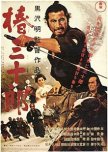
Subtle parody of 'Samurai' films
Sanjuro is considered a sequel to 'Yojimbo', but their storylines are independent. The titular character Sanjuro, we presume, is the same in both. This is a great film, but it is strongly recommended to watch Yojimbo first. The experience of watching Sanjuro is also enhanced if one has watched many of the more 'serious' classic samurai films including ones by Akira Kurosawa. Sanjuro, both the character and film, take us on a comedic journey of the world of lord, lady, gentleman warrior, and an outcast savant warrior.Compared to Yojimbo, Sanjuro's plot is less developed and achieved more quickly in pace and runtime. The main feast of the film is in the characters, mainly Sanjuro and the contrasting group of 9 men he, by serendipity, 'mentors' from the path of foolish death. To win in a socially ordered world of the samurai, one must think obliquely, act unruly even, to accomplish one's aims. The chamberlain, Mutsuta, the one with a long horse face, is another one of these people on the fringe of social acceptance, but is very clever in achieving aims through subtle strategy, and not the chivalrous wave a sword around methods. It seems Kurosawa is poking fun at socially ordered rules and brotherhoods.
Many of the role characters are terrific. The prisoner 'spy' adds much to the comedic presence of the main ensemble. The chamberlain's wife is full of witty dialogue and regard for this 'interesting' Sanjuro. The henchmen play their roles quite well. The plot exists, it seems, for Kurosawa to display the nuances and parodies of these familiar character types.
The music in the film is strong and includes some of the familiar music of Yojimbo. There is a heroic fanfare that is clearly a theme of parody/comedy. It's easily recognized.
This film is a treat for the veteran Kurosawa and/or classic Japanese cinema viewers.






